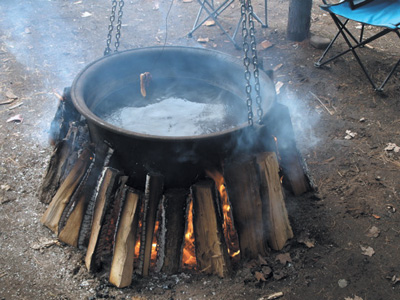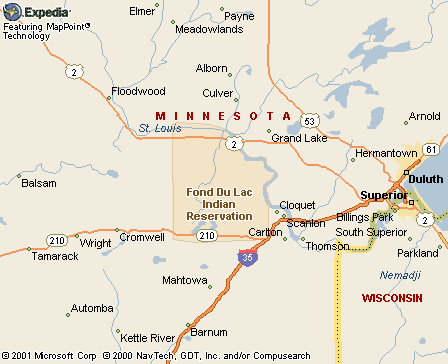 |
Canku Ota
|
 |
|
(Many Paths)
|
||
|
An Online Newsletter
Celebrating Native America
|
||
|
September 2016 - Volume
14 Number 9
|
||
|
|
||
|
Jim Northrup -
A Connection To Home |
||
|
by Nick Vander Puy -
News From Indian Country April 2010
|
||
|
editor's note: We re-publish this article as a tribute to a friend. It speaks volumes of Jim's dedication to his heritage.
Northrup would ration the sweet month by month until his tour was ended. He says the maple sugar cakes got him through the war to return him back home. Reminiscing around the fire at this year's sugar bush, a large kettle hanging from a chain on a solid log frame, the sap in a mad boil, his extended family near with a euphoric look on his face, Northrup recalls, "That little sugar cake she sent me in Vietnam was my connection to home on the rez, just taking a little bite of it would bring back all these memories, the heat of the fire, the smell of the wood, hauling sap, slippin' and slidin' in the woods, and all the laughter and the stories told around the fire." Pat Northrup offers me some coffee and a peanut butter sandwich slathered in maple syrup. The Northrup sugar bush is all sheeked out with a large brown canvas tarpaulin covering the work area, underneath are folding chairs, stacked wood, axes, splitting mauls, and square plastic thirty gallon garbage containers filled with fresh maple sap. There's a filter for draining into the kettle and a skimmer for scraping the scum off the boiling pot. A pickup truck waits with empty containers in the bed for the next sap patrol. The sugar bush tradition continues at the Northrup home. For the past several years Northrup's nephew Kris Beaulieu has been helping out. He's splitting some maple and birch for the fire. Jim's wife Pat, Kris and I carry the split wood over to the fire and fit the pieces like a wall around the kettle. The wall concentrates the heat upward like a rocket stove, causing the sap to furiously boil. A piece of bacon suspended from some wire prevents the kettle from boiling over. Earlier this spring we checked out some metal taps at the local hardware store. They cost almost three dollars a piece. Jim Northrup stays with tradition and saves some money by carving his own taps from cedar and sumac. He starts by carving one side down with his Buck knife near the hole, then he repeats the procedure three times until the tap fits nicely into a three/eighth inch hole. While carving and shedding splinters he laughs, "No making a mess out here." Northrup uses the home made taps along with one gallon milk jugs for his sugaring operation. "Kris," he says, "go and get my board with the holes in it. It's behind my chair in the house." Kris retrieves the jig for Jim to place the tap into. It makes a nice snug fit. We visit some more around the fire. A neighbor woman and her little boy come over from across the street attracted to the fire. The little boy plays with a rez wiener dog, while the woman talks about her pregnancy. Back in the late 1800's, a government farmer sent to transform Anishinaabe hunters/gatherers into sod busting farmers wrote in his report, "The Indians are guilty of excessive visiting." When Northrup recalls this grim government assessment both Pat, and Jim, and I break out in a loud cackle around the fire. A steady stream of visitors comes by all day with rez gossip and jokes. Northrup tells a story about a Marine in training who was getting ready to jump out of an airplane. The soldier choked at the last moment, too terrified to jump. The Drill Instructor screamed and hollered at him to no avail. The plane flew back to base. Everybody on board was ashamed. During the debriefing the DI hollered, "You either jump out of that airplane tomorrow or I'm gonna sodomize you." The next day the soldier, with this warning in mind, successfully jumped out of the airplane. Back later in the day at the NCO club, after a few drinks, someone asked the Marine, "Did you jump?" The soldier replied, "A little bit, at first?" Stories like these and others float around the fire. Pat Northrup motions from the house for me to visit the kitchen. She wants to teach me how to make sugar cakes. She pours about a pint of maple syrup into a small cast iron kettle. She stirs around fifteen minutes as the syrup thickens into near taffy. When the sap begins to stand up, change color, and not spread, she pours the thickened syrup into a mold. It sets up very quickly into cakes. She rapidly stirs the residue into maple sugar. "What I like about this season," she says, "is the visiting around the fire, making our own food, and the good feeling of tiredness at the end of the day." Outside, we hear the truck returning with around forty gallons of sap. Joe Northrup, Vicky Ellis, and Kris Beaulieu unload the truck and pack the remaining snow around the barrels. In a little while, Pat serves us all some pork, and potatoes, and wild rice (mahnomin). She sends me back to Lac Courte Oreilles with some sugar cakes and bids me to stay between the ditches on the way home. |
|
|
|
||
|
|
||
| Canku Ota is a free Newsletter celebrating Native America, its traditions and accomplishments . We do not provide subscriber or visitor names to anyone. Some articles presented in Canku Ota may contain copyright material. We have received appropriate permissions for republishing any articles. Material appearing here is distributed without profit or monetary gain to those who have expressed an interest. This is in accordance with Title 17 U.S.C. Section 107. | ||
|
Canku Ota is a copyright ©
2000 - 2016 of Vicki Williams Barry and Paul Barry.
|
||
 |
 |
|
|
The "Canku
Ota - A Newsletter Celebrating Native America" web site and
its design is the
|
||
|
Copyright ©
1999 - 2016 of Paul C. Barry.
|
||
|
All Rights Reserved.
|
||
 When
Jim Northrup was walking point with his M-16 in Vietnam, serving
in the US Marine Corps during the 1960's outside DaNang, every month
his grandmother would send him a maple sugar cake from their home
on the Fond Du Lac Ojibwe reserve in northeastern Minnesota.
When
Jim Northrup was walking point with his M-16 in Vietnam, serving
in the US Marine Corps during the 1960's outside DaNang, every month
his grandmother would send him a maple sugar cake from their home
on the Fond Du Lac Ojibwe reserve in northeastern Minnesota.